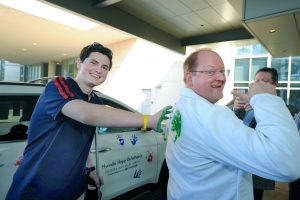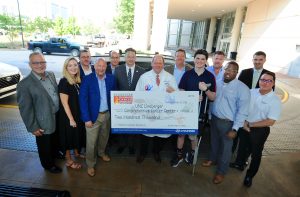
Advances in research and clinical care have led to more children being cured of cancer, but some of the life-saving treatments can cause significant health consequences later in their lives. Research supported by the Hyundai Hope on Wheels program could one day help clinicians put the brakes on these medical issues, allowing pediatric cancer survivors to live healthier lives.
UNC Lineberger Comprehensive Cancer Center’s Andrew Smitherman, MD, MSc, was awarded a two-year, $200,000 Hyundai Young Investigator Grant to investigate approaches to identify those patients most at risk for late stage side-effects. According to Smitherman, knowing in advance who will develop treatment-related health issues may make it possible to reduce the severity of, or even prevent, those complications.
Smitherman was honored during a ceremony at the N.C. Cancer Hospital last week that included comments from Jake Hanley, 15, who was diagnosed with osteosarcoma in 2018 and is one of Smitherman’s patients; John Szymanski, general manager, Mid-Atlantic Region, Hyundai Motor America; and Grant Loftin, owner of New Bern Hyundai.
“Unfortunately, two thirds of (pediatric and adolescent cancer) survivors will develop long-term side effects from their treatment, like second cancers, heart disease and lung disease,” Smitherman said. “Many of these conditions within the general population wouldn’t occur until individuals are in their 60s or 70s, but these are occurring in these childhood and adolescent cancer survivors in their 20s, 30s and 40s. We’re looking at ways that we can identify survivors who are at risk of early aging so that we can intervene sooner to prevent those long-term side effects of cancer treatment.”

Smitherman, the medical director of the UNC Lineberger Adolescent and Young Adult Cancer Program and an assistant professor of pediatrics at UNC School of Medicine, is conducting research focused on developing a blood test to identify biomarkers of early aging. Detecting signs of premature aging at the cellular level may make it possible to address or monitor for potential health issues before they develop.
Hanley, whose treatment included nine months of chemotherapy and two knee replacements, was happy to share that, as of this week, it has been 150 days since his last chemotherapy.
“I just started 10th grade. I missed all of ninth grade (because of his cancer treatment). But now I’m doing a lot better,” Hanley said. “I’d just like to thank Dr. Smitherman and everyone here at UNC for all the great work they’ve done and for all the support.”
He is participating in a clinical trial that tracks the health of young cancer survivors following treatment. “When Dr. Smitherman asked if I would like to participate in a study, I said ‘yeah of course. I would love to help,’ ” Hanley said.
“This is really one of my favorite things to do,” Szymanski said, speaking of the Hyundai Hope on Wheels program, which has awarded $160 million in pediatric cancer research grants during the past 21 years. He said while the purpose of the ceremony is to award the grant, the “most important and most fun part of this is we got to honor our brave cancer fighter.”
Hyundai’s Hope on Wheels program has provided UNC Lineberger with $900,000 in research support since 2011, including two grants totaling $350,000 to Ian Davis, MD, PhD, a $100,000 grant to Thomas Alexander, MD, MPH, and a $250,000 grant to Barbara Savoldo, MD, PhD.
Loftin said all of his fellow dealers are proud to be part of the Hyundai Hope on Wheels campaign. “Our commitment to the fight against pediatric cancer is not about selling cars or promoting our business,” he said. “This is truly at the core of who we are and what we do to try and make the world a better place because ‘Every Handprint Tells a Story,’ and children’s lives are precious.”
The event ended with the signature handprint ceremony. Patients from the N.C. Cancer Hospital’s pediatric hematology-oncology clinic were invited to paint their hands and then place them on a Hyundai Santa Fe SUV parked outside the cancer hospital. Several patients even put their painted handprints on Smitherman’s white clinic coat, a fitting and lasting reminder of Hyundai’s support of his research.
